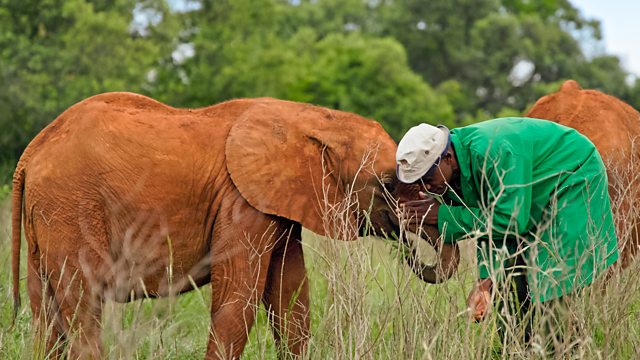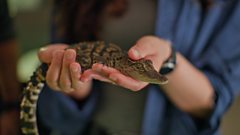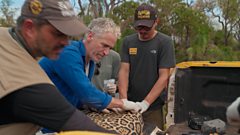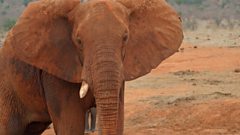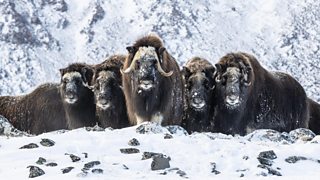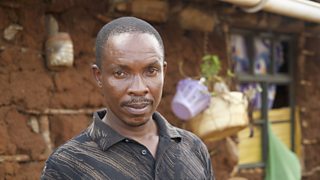Episode 2
In the second year of a seven-year project, six presenters chart the fight to save the planet’s endangered ecosystems. In this episode, we visit Brazil, Cambodia and Kenya.
It’s year two of ���˿���’s ambitious, seven year project charting the fortunes of six of Earth’s most threatened ecosystems, and in the second episode we join three presenters as they celebrate the experts and communities fighting to rebalance another trio of vulnerable habitats.
Gordon Buchanan returns to Brazil, Ella Al-Shamahi to Cambodia and Ade Adepitan to Kenya.
Gordon Buchanan returns to Brazil, the most biodiverse country on our planet and home to one of the world’s most important wetlands, the Pantanal. Gordon’s here to revisit a pioneering project that is committed to saving one of the Amazon’s iconic predators, the jaguar, and to understand the importance of a healthy ecosystem.
The Pantanal is vital to the health of the jaguar’s territory. Fed by the Amazon Rainforest’s water cycle, it’s an extraordinarily rich habitat, and home to an array of water and land species. Gordon takes to the water and sees first-hand how this place is perched on a knife edge. As climate change accelerates, the Pantanal is becoming drier, endangering its wildlife and vegetation, including the jaguar. Gordon hears from a local conservationist how the plans for up-river dams could severely impact this precious ecosystem.
Habituating jaguars is a vital part of ecotourism, enabling paying guests to experience these iconic creatures. The profits fund vital research and this year Gordon follows the team on their annual collaring project, darting jaguars and collecting samples and data from these super-sized cats. Once sedated, Gordon gets the opportunity to get hands on with the scientists, witnessing for himself the range of samples and data the team are collecting. This will provide valuable insights into the jaguar’s movements within their ever-changing habitat.
Ella Al-Shamahi returns to Cambodia, an area experiencing increasing economic growth. This growth is putting massive pressure on natural resources, and is leading to expanding cities and potentially devastating over-exploitation of the natural world.
Ella discovers the reality about our planet’s most exploited resource after water – sand. The Mekong River is vital to the health of not only this region but to five other countries, and is being dredged for this valuable resource, endangering the structure and health of this mighty river system. Ella takes to the water with a leading Mekong expert to see the extent of the extraction. Unsustainable and highly destructive, mining could possibly sound the death bell for this precious ecosystem. UK scientists are using high quality satellite imagery that reveals the extent of the damage and there’s hope that regulation can slow this exploitation.
Biodiversity plays a vital role in building resilience in these threatened landscapes. Ella joins an expedition that will reintroduce the nearly extinct Siamese crocodile into the depths of the Cardamom Mountains. To date, the survival of these critically endangered animals has been down to the cultural connection between the local people and the crocodiles, who they consider sacred. Ella and the team are taking ten crocodiles to a safe and very remote site. The crocodiles are inserted into bamboo rolls, which are soaked in water to keep them cool, then bundled onto the back of mopeds and driven to the release site. It’s a 24-hour journey, crossing rivers and tackling forest pathways, all the time ensuring the crocodiles are safely stowed. On arrival, the team acclimatise the animals before their final release. We meet those who discovered one of the last remaining crocodiles and an elder of the village explains the role of crocodiles and the natural world to his people.
Ade Adepitan returns to Kenya to report on the devastating effect of rising temperatures and failed rains. The conditions are extreme, and the challenges, unimaginable. Both communities and wildlife are fighting to survive the worst drought in 40 years.
When Ade visited Kenya in 2021, the elephants were severely affected by drought, but 2022 saw a new and sinister problem. People and elephants were now fighting over dwindling food and water supplies, even killing each other in their desperation to survive.
Ade finds out about a project that could help farmers and elephants to co-exist until the next rains finally arrive. Using biology and behavioural science, leading elephant scientists, with the input of locals, have created affordable tools for repelling elephants from farms and reducing conflict. Ade travels to Sagalla, near Tsavo National Park, where its community is leading the way and testing these devices. He meets local farmer Jones, who has created what he calls a ‘noisy gun’ from tin cans and wood. Other devices include condoms full of chilli powder and beehives strung along fences. Ade finds a community under extreme pressure, but the ingenuity of the ‘Human Elephant Coexistence’ toolbox is providing a genuine ray of hope.
Last on
More episodes
Previous
Next
You are at the last episode
Clips
-
![]()
Saving the Siamese crocodile
Duration: 01:44
-
![]()
Collaring a male jaguar in the Pantanal, Brazil
Duration: 03:29
-
![]()
A toolbox to stop human-elephant conflict
Duration: 03:37
Broadcasts
- Sun 23 Apr 2023 20:00
- Sat 20 May 2023 01:35
